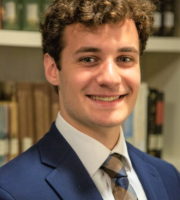
UPDATED
Students’ rights group warns new policy is an ‘unconstitutional infringement on students’ basic rights’
The University of Oregon Board of Trustees has approved a resolution that increases the school’s disciplinary jurisdiction, allowing administrators to now punish students for their off-campus behavior.
Under the new resolution, approved in May, the university can refer a student for disciplinary action for any offense that was seen as having a significant impact to the university community despite where it may take place.
The prior code of conduct limited this only to actions which took place on campus or at a university-sponsored event.
University spokesperson Molly Blancett did not respond to a request for comment from The College Fix.
“The University may apply the Student conduct Code to Student behavior which occurs off-campus in which the University can demonstrate a clear and distinct interest as an academic institution regardless of where the conduct occurs and a) which causes substantial disruption to the University community or any of its members, b) which involves academic work or any University records, documents, or identifications, or c) which seriously threatens the health or safety of any person,” the resolved policy reads.
The measure was never presented to the UO senate, according to the Daily Emerald, the student newspaper.
While the official reason for the policy update is unknown, the Emerald explains that the resolution coincides with a number of disruptive parties which took place near campus.
In May, Eugene police responded to a large house party which drew noise complaints and COVID protocol concerns from neighbors. Police were able to disperse the party, but were harassed by the party-goers.
When a photo of the event went viral on Twitter, the University of Oregon’s Twitter page responded, explaining that little could be done by the administration at the time.
We are disappointed to see the photo of large gathering of young people at what appears to be an off-campus party involving UO students from over the weekend. 1/3
— University of Oregon (@uoregon) May 3, 2021
“The UO is limited in the actions it can take with individuals who live in private homes. However, the office of student conduct and community standards is investigating complaints involving this photo, and will take any necessary appropriate actions,” reads their reply in part.
In response to the policy change, the student rights activist group Foundation for Individual Rights in Education released a statement calling the move disturbing and for the university to rescind it.
“To uphold its constitutional obligations to its students, UO must disavow this unsound policy and implement a lawful one instead,” the statement reads in part.
In a statement to The College Fix, Alex Morey, editor-in-chief of FIRE’s The Torch, said that an overly vague term used in the policy may potentially lead to unrestricted action by the university.
“[T]he new ‘substantial disruption’ language here is so broad that it purports to give the university the power to go far beyond addressing its obligations, giving them power to punish students for behavior that occurs far from campus, on students’ free time, and for conduct that has a negligible impact on the campus community,” she said via email.
She noted the “substantial disruption” was language originally intended for use in grade school.
“The ‘substantial disruption’ language UO is attempting to co-opt here was developed for use with children on the grounds of K-12 campuses,” Morey told The Fix. “K-12 students have fewer First Amendment rights and teachers have much broader discretion to censor student speech that might disrupt classroom environments.”
“The Supreme Court is expected to rule any day now in the case of Mahanoy v. BL on whether such a test might apply off-campus in a K-12 student’s free time and where the link between the speech and the campus is tenuous at best. It’s a genuine question.”
“What is not a question is whether the ‘substantial disruption’ test was ever intended to be used by college administrators policing their adult students’ behavior 24/7, anywhere they might be in the world,” Morey said. “That legal test was not intended to be used on adults off campus; to do so is an unconstitutional infringement on students’ basic rights.”
MORE: Law professor may be fired after personal blog post criticized Chinese government
Editor’s note: The article has been updated — the original version used male pronouns to refer to Ms. Morey.
IMAGE: Mat Hayward / Shutterstock
Like The College Fix on Facebook / Follow us on Twitter






Please join the conversation about our stories on Facebook, Twitter, Instagram, Reddit, MeWe, Rumble, Gab, Minds and Gettr.